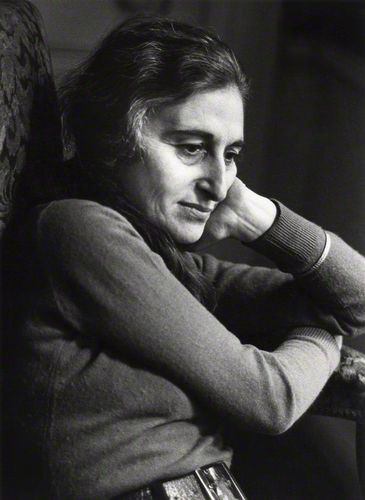Ruth Prawer Jhabvala (Ruth Prawer Jhabvala)

Ruth Prawer was born in Cologne, Germany to Jewish parents Marcus and Eleanora (Cohn) Prawer. Marcus was a lawyer who moved to Germany from Poland to escape conscription and Eleanora’s father was cantor of Cologne’s largest synagogue. Her father was accused of communist links, arrested and then released and she witnessed the violence unleashed against the Jews during the Kristallnacht. The family was among the last group of refugees to flee the Nazi regime in 1939, emigrating to Britain. Her elder brother, Siegbert Salomon (1925–2012), an expert on Heine and horror films, was fellow of The Queen’s College and Taylor Professor of German Language and Literature at the University of Oxford.
During World War II, Prawer lived in Hendon in London, experienced the Blitz and began to speak English rather than German. Charles Dickens’ works and Margaret Mitchell’s Gone With the Wind kept her company through the War years and the latter book she read while taking refuge in air raid shelters during the Luftwaffe’s bombing of London. She became a British citizen in 1948. The following year, her father committed suicide after discovering that forty members of his family had died during the Holocaust. Prawer attended Hendon County School (now Hendon School) and then Queen Mary College, where she received an MA in English literature in 1951.
Jhabvala lived in India for 24 years from 1951. Her first novel, To Whom She Will, was published in 1955. It was followed by Esmond in India (1957), The Householder (1960) and Get Ready for the Battle (1963). The Householder, with a screenplay by Jhabvala, was filmed in 1963 by Merchant and Ivory. During her years in India she wrote scripts for the Merchant-Ivory duo for The Guru (1969) and The Autobiography of a Princess (1975) and collaborated with Ivory for the screenplays for Bombay Talkie (1970) and ABC After-school Specials: William – The Life and Times of William Shakespeare (1973). In 1975, she won the Booker Prize for her novel Heat and Dust which was later adapted into a movie. That year, she moved to New York where she wrote The Place of Peace.
Jhabvala “remained ill at ease with India and all that it brought into her life” and wrote in an autobiographical essay, Myself in India, published in the London Magazine, that she found the “great animal of poverty and backwardness” made the idea and sensation of India intolerable to her, a “Central European with an English education and a deplorable tendency to constant self-analysis”. Her early works in India dwell on the themes of romantic love and arranged marriages and are portraits of the social mores, idealism and chaos of the early decades of independent India. Writing of her in the New York Times, novelist Pankaj Mishra observed that “she was probably the first writer in English to see that India’s Westernizing middle class, so preoccupied with marriage, lent itself well to Jane Austenish comedies of manners”.
Jhabvala moved to New York in 1975 and lived there until her death in 2013, becoming a naturalised citizen of the United States in 1986. She continued to write and many of her works including In Search of Love and Beauty (1983), Three Continents(1987), Shards of Memory (1995) and East Into Upper East: Plain Tales From New York and New Delhi (1998), portray the lives and predicaments of immigrants from post-Nazi and post-World War Europe. Many of these works also feature India as a setting where her characters go to in search of spiritual enlightenment only to emerge defrauded and exposed to the materialistic pursuits of the East. The New York Times Review of Books chose her Out of India (1986) as one of the best reads for that year. In 2005 she published My Nine Lives: Chapters of a Possible Past with illustrations by her husband and the book was described as “her most autobiographical fiction to date”.
In 1951, Prawer married Cyrus S. H. Jhabvala, an Indian Parsi architect and, later, head of the School of Planning and Architecture. The couple moved into a house in Delhi’s Civil Lines where they raised three daughters: Ava, Firoza and Renana. In 1975 Jhabvala moved to New York and divided her time between India and the United States. In 1986, she became a naturalised citizen of the United States. Jhabvala died in her home in New York City on 3 April 2013 at the age of 85. James Ivory reported that her death was caused by complications from a pulmonary disorder. She was survived by her husband, her three daughters and six grandchildren. Reacting to her death, Merchant-Ivory Productions noted that Jhabvala had “been a beloved member of the Merchant Ivory family since 1960, comprising one-third of our indomitable trifecta that included director James Ivory and the late producer Ismail Merchant” and that her death was “a significant loss to the global film community”.
Born
- May, 07, 1927
- Cologne, Prussia, Germany
Died
- April, 03, 2013
- USA
- New York City, New York

